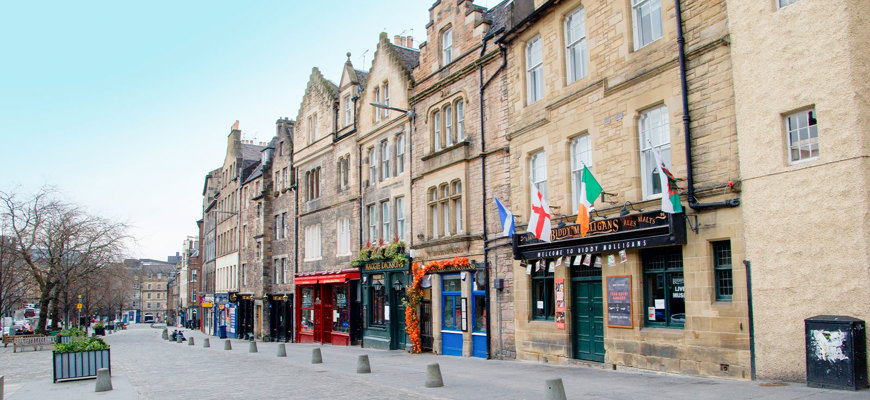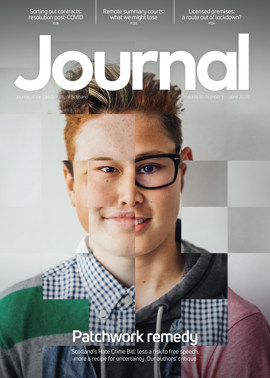Licensed premises and the road to "normal"

On 20 March this year, all cafés, bars, pubs and restaurants were closed as part of measures to prevent the spread of COVID-19. The closure of hotels followed shortly after. The sector was the first in the firing line and, by Minister Fergus Ewing’s own admission, will be the one to shut the door behind it. All this for a sector which, in the last decade, has been at the sharp end of a total overhaul of licensing legislation, seemingly disproportionately high business rates, tourism tax and Brexit.
It’s not just direct premises closure that affects these businesses; the misery is circular. The failure – in some cases, overnight – of travel agencies and suppliers, to name but a few, has already caused the demise of some well-known hotels. That story will be repeated throughout the country in premises of all descriptions.
And so it’s not just lawyers with liquor licensing experience who need to be live to the issues that clients in this sector face. The success or failure of a business with an alcohol licence will affect clients of all shapes and sizes: landlords, banks, pension trustees and investors, manufacturers and, inevitably for some, insolvency practitioners. It is an issue which affects clients, and therefore lawyers, in all sectors.
The early days of lockdown
Once the initial shock of lockdown was over, restaurants and licensed premises did what they have always done. They met the challenges head on, through innovation and adaptation. This sector is known for its resilience. Many of you will have benefited from your local café or restaurant’s expansion into takeaway during lockdown.
However, while many in the industry benefited from the Government’s financial support schemes, others, for example those with a rateable value of over £51,000, and who therefore do not qualify for rates relief, will struggle to survive over the coming months. There have also been reports of many being turned down for hardship and other grants. The struggle is compounded for the tourism sector, one of the most significant contributors to Scotland’s economy, which will likely miss the entire summer season.
Routemap out of lockdown
At the time of writing, we are at the start of phase 1 of the easing of lockdown. The landscape – assuming we all behave ourselves – looks a bit like this for the trade:
Phase 1 of four phases began on 28 May, with the Government saying it will “no longer discourage” takeaway and drive-through food outlets (putting aside the fact that many licensing boards and licensing standards officers have played a critical role in supporting local restaurants and cafés transform their businesses to a takeaway model during lockdown). But that’s it, so far as licensed premises go.
The glimmer of hope for the licensed trade begins in phase 2, starting 18 June. Pubs and restaurants will be able to trade in open outdoor spaces, provided physical distancing and increased hygiene are adhered to. Outdoor markets will also be allowed where appropriate management of numbers is in place. Robust risk assessment and local authority cooperation will be critical for these clients.
As with everything regulatory, what is desirable in theory isn’t always possible in practice. There are a number of hurdles to overcome if a client wants to convert its business to take advantage of the allowances in phase 2. First, the premises licence must already have an external area “permission”, i.e. it must already be delineated in the layout plan of the premises licence. If not, the most practical solution in the current situation is an application(s) to the local licensing board for an occasional licence. Many licensing boards have a six-week lead-in time for processing these types of applications, which would clearly have to be relaxed if this was to work.
Secondly, planning consent may well be required for additional space. Currently, consent is only granted for 28 days and there is the inevitable processing timescale and cost involved. All of these would need to be relaxed if this is to be workable in practice. Lastly, a tables and chairs permit is required for those wishing to put street furniture on a public pavement. Again, these permits do not always come cheaply, and require, for good reason, risk assessment statements. When time and money are of the essence, the relaxation of some of these points must apply.
Schedule 5 to the Coronavirus (Scotland) Act 2020 goes some way to acknowledging the need for flexibility by, for example, relaxing previous statutory timescales and restrictions and allowing for virtual licensing board hearings during the current crisis.
The outdoor operation will be good news for those with enough land – or money – to make it work. However, it will come as little consolation to, for example, already struggling city centre restaurants, or local independent cafés with at most half a dozen external covers. They will need to tough it out until phase 3, due to begin on 9 July. In that phase, pubs and restaurants can open in indoor spaces, subject to physical distancing. With the reopening of places of worship in that phase will come the reinstatement of marriage ceremonies, which coincides with relaxation on restrictions on accommodation providers such as hotels (it is worth noting that holiday accommodation services can currently take remote bookings for a future date). The wheels will begin to turn...
Staffing issues during and after lockdown
Despite the lockdown, it’s business as usual for licensed premises in terms of statutory and regulatory compliance. Personal licence training and renewal applications still require to be completed, and on time. The deadlines for these have been publicly extended by many licensing boards, with others showing similar levels of pragmatism on the ground.
Operationally, these premises will need to think long and hard about the logistics of reopening. The COVID-19/Brexit double whammy will almost inevitably mean depleted staff. That in turn will impact on the number of on-site personal licence holders, which could then potentially affect the availability of the required designated premises manager on the premises.
Implementing social distancing
As we’ve seen, none of these businesses can operate, either on an outdoor or indoor model, unless they implement social distancing measures, including the two-metre minimum contained in the Health Protection (Coronavirus) (Restrictions) (Scotland) Regulations 2020. Therein lies another huge practical challenge. The footprint of some premises simply won’t allow that. For those that have the physical space, it has been suggested that across the board, capacity might be reduced by up to 80%. That is simply not sustainable. At the time of writing, the Government is coming under increasing pressure to revise this to one metre, which is the distance referred to by the World Health Organization, not least because it refers to WHO criteria elsewhere in its guidance.
But with challenge comes opportunity, particularly in the tech world. Customers accessing menus via QR codes on their tables or apps on their phones would cut out the need for a physical menu. But what about other hard surfaces – bread baskets, bottles of ketchup...? Will a bottle of hand sanitiser be the new normal next to your salt and pepper shakers? Temperature checks at the door and revised seating layouts are also being trialled. Whether any of these measures are realistic will depend on an operator’s resource, both physical and financial. But it will also depend on the nature of the operation and its target audience. A high capacity, high turnover model will struggle with some of these measures. Equally, a small, high end restaurant may prefer to close its doors temporarily to having its clientèle quaffing Chateau Lafite behind perspex visors.
Phase 4
Phase 4 will apparently see a return to the new normal (whatever that may be!), subject to compliance with public health guidelines. This will include mass gatherings. Again though, that is subject to public health and social distancing considerations. The resumption of mass gatherings will also bring challenges under civic government licensing.
Formal reviews will take place at least every three weeks, and the Scottish Government has been at pains to say that dates are not set in stone and will be amended as appropriate.
Stakeholder collaboration
As we’ve seen, key to the success of operators will be co-operation at local authority level. Practically speaking, that must involve the prioritisation of “urgent” applications which can either be dealt with under delegated powers or can be waved through unless controversial, in much the same way as was often done with personal licence applications during transition from the old to the current Licensing (Scotland) Act. Although dealing with their own pressures, licensing boards have shown themselves to be flexible and pragmatic, prioritising urgent applications, often through written submissions.
The future
The future remains uncertain. But at least we are starting to talk about one. Beyond the logistics of how to trade, the big concern for those businesses able to survive the crisis will be how quickly consumer confidence will return. That will depend on operators being able to show that they can manage premises safely. But that cannot be done in isolation; it requires both financial support and regulatory flexibility. After all, the end of lockdown and the return of business as usual are two very different things.






